
This resource provides information on all of the aspects of global warming, climate change, and the future of the earth.

This resource provides information on all of the aspects of global warming, climate change, and the future of the earth.
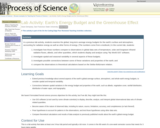
"Earth's Energy Budget and the Greenhouse Effect" is a lab activity in which students use computers and scientific applications software to access, display, describe, analyze, and interpret global, climate-related data sets related to the earth's energy budget and the greenhouse effect.
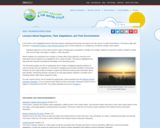
This article highlights lessons that help K-grade 5 students understand that animals and plants can only survive in certain environments.The lessons support the theme of an issue of the free online magazine Beyond Weather and the Water Cycle. The theme is "We Depend on Earth's Climate."
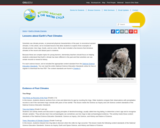
Three types of climate proxies -- tree rings, fossils, and ice cores -- are the subjects of lessons that will help K-5 students understand that Earth's climate has been different in the past and that scientists can reveal its history. This article is from the science lessons column of the free, online magazine Beyond Weather and the Water Cycle. The magazine is structured around the seven essential principles of climate literacy and identifies age-appropriate resources for young learners.
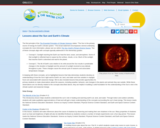
Concepts underlying the first of the Essential Principles of the Climate Sciences are aligned with topics typically taught in the elementary grades. This article identifies lessons that will help elementary students develop an understanding of how Sun's light warms Earth and how variations in daylight hours are associated with seasonal change. This article appears in the free, online magazine Beyond Weather and the Water Cycle.
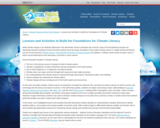
This article includes lessons that elementary teachers can use to build the foundations of climate literacy while meeting elementary science standards. Lessons are paired with literacy activities as well.
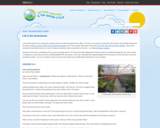
With two simple classroom experiments and easy-to-read text, this original story is designed to introduce young learners to the greenhouse effect. The author provides different versions of the story for grades K-2 and 3-5, as well as different formats for differentiated instruction. The free online magazine Beyond Weather and the Water Cycle focuses on principles of climate literacy that are appropriate for young learners.

This informational text explores Laura Gladstone's experience working at the IceCube telescope at the South Pole. She shares the clothing worn, food, what she did for fun, and how life there differs from what most of us know, including what one does NOT hear or see. The text is written at a grade two through grade three reading level. This version is a full-color PDF that can be printed, cut and folded to form a book. Each book contains color photographs and illustrations.

This informational text explores Laura Gladstone's experience working at the IceCube telescope at the South Pole. She shares the clothing worn, food, what she did for fun, and how life there differs from what most of us know, including what one does NOT hear or see. The text is written at a grade two through grade three reading level. This is a PDF containing the informational text and a glossary.

This informational text explores Laura Gladstone's experience working at the IceCube telescope at the South Pole. She shares the clothing worn, food, what she did for fun, and how life there differs from what most of us know, including what one does NOT hear or see. The text is written at a grade four through grade five reading level. This version is a full-color PDF that can be printed, cut and folded to form a book. Each book contains color photographs and illustrations.

This informational text explores Laura Gladstone's experience working at the IceCube telescope at the South Pole. She shares the clothing worn, food, what she did for fun, and how life there differs from what most of us know, including what one does NOT hear or see. The text is written at a grade four through grade five reading level. This is a PDF containing the informational text and a glossary.

This informational text explores Laura Gladstone's experience working at the Ice Cube telescope at the South Pole. She shares the clothing worn, food, what she did for fun, and how life there differs from what most of us know, including what one does NOT hear or see. The text is written at a kindergarten through grade one reading level. This version is a full-color PDF that can be printed, cut and folded to form a book. Each book contains color photographs and illustrations.

This informational text explores Laura Gladstone's experience working at the IceCube telescope at the South Pole. She shares the clothing worn, food, what she did for fun, and how life there differs from what most of us know, including what one does NOT hear or see. The text is written at a kindergarten through grade one reading level. This is a PDF containing the informational text.
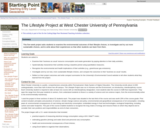
This five-week project asks students to examine the environmental outcomes of their lifestyle choices, to investigate and try out more sustainable choices, and to write about their experiences.
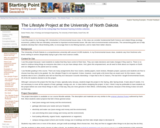
I use the Lifestyle Project in my Introduction to Environmental Issues class. This 3-week project asks students to make changes to their everyday environmental habits. This helps students realize that they have control of their lives and they can make decisions and make changes if they want to. And, given this empowerment, students can think about their impacts on Earth and their obligations to the planet and our society.
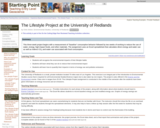
This three-week project begins with a measurement of "baseline" consumptive behavior followed by two weeks of working to reduce the use of water, energy, high-impact foods, and other materials. The assignment uses an Excel spreadsheet that calculates direct energy and water use as well as indirect CO2 and water use associated with food consumption.

The Arctic plays an important role in regulating Earth's climate. The region reflects much of the Sun's energy and helps keep the planet cool. Data collected by NASA have revealed that sea ice in the Arctic has steadily declined over the past 30 years leading to increased solar radiation absorbed. Examine these images showing that the regions of greatest ice loss correspond with regions of greatest increase in absorption. Background information and teaching tips are provided.

In this video segment adapted from the Alaska Native Heritage Center, discover the connections between Alaska Native subsistence culture and the natural cycle of the seasons.
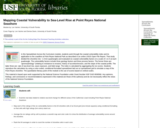
Spreadsheets Across the Curriculum/Geology of National Parks module. Students work with a color-coded conditional-formatted spreadsheet map to work through a USGS report applying a coastal vulnerability index, examining real data related to relative sea-level change for different areas of the Californian coas,t including Point Reyes National Seashore.

Observe how the sea ice changed in 2016 after it reached its maximum extent in late March and proceeded through the melt season in this video from NASA. Scientists study sea ice because it influences global climate. Resouces include background information and teaching tips. Closed caption available. [1:10]